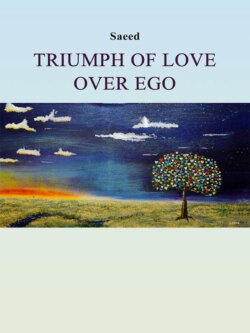Читать книгу Triumph Of Love Over Ego - Saeed Habibzadeh - Страница 14
На сайте Литреса книга снята с продажи.
Learning or suffering
ОглавлениеWe basically have two possible ways of dealing with our life and its daily events: we can either take everything personally and suffer because our life does not unfold the way we would like it to, or we can look at life objectively. Meaning, we focus our attention not on our emotions, but on the inner message of what is happening.
This way we recognize that everything that happens has its own history, message and objective. If we are constantly personally affected by everything that happens in life, we will constantly be suffering and trying to change life to comply with our own egoistic ideas. The problem with egoistic ideas is that, even when they do come true, they do not make us even the slightest bit happy, the reason being that they do not originate from our heart, but only mirror our superficial emotions and moods. We can only be happy when we fulfil our true heart’s desire. Our true heart’s desire does not cause any pain or suffering to us or our fellow men. Fulfilling these desires makes us strong and happy, but fulfilling our egoistic desires makes us lonely and unhappy. The more egoistic we are, the more we suffer. We are egocentric; we regard everything in an entirely self-centred manner. We use our ego as the measure for judging everything around us as pleasant or unpleasant. The result is that we suffer, because we keep isolating ourselves more and more from those around us by our egoistic behaviour. We lose touch with reality, because we make up our own reality and live in a world of make-belief.
But when we proceed to take things less and less personally and continue to realize that they intend to convey their specific meanings and messages to us, we no longer regard our problems as enemies to be annihilated, but as friends that have information for us.
We only suffer when we are not prepared to learn and instead blame others for our mishaps.
At this point it has to be said that true willingness to learn can also carry its own problems, conflicts, illness and suffering. This is because we leave behind that which is old and outdated and are open to that which is new. This transition from the old to the new life holds many changes, some of which may be uncomfortable. For instance, our circle of friends may change, the way we relate to our family may alter and our relationships may change or break up. All these are possible consequences of transforming our consciousness.
When you change the way you think, feel and act, then you will be less able to relate to people from your past.
These often sad and uncomfortable experiences are only a short phase of life – the transition from old to new. If you treat yourself and your life with honesty and sincerity, you will gradually leave the old behind and find more and more delight in being your own person in your own life. It is important not to lose courage. Travellers on the road to truth must not allow themselves to be discouraged and unsettled.
Nothing is lost, it merely makes room for that which is new, better, necessary or inevitable.
It is essential that we are willing to learn. However, learning is particularly difficult for us when others keep pointing out our shortcomings. There is no point in taking offence. Of course some will immediately defend themselves by saying things such as: “I’ve had no complaints so far!” But the fact that we have received no complaints cannot be taken as evidence that we have made no mistakes. This is a very superficial and dangerous attitude, because those people are in effect saying: “We won’t change and we’ll just carry on as before until something goes wrong – and maybe then we’ll change it.”
When someone goes to the trouble of explaining something to us with courage and care, or points out to us a mistake we made, we need to understand this as a sign of love and affection. We should be grateful to this person and work on our ability to handle criticism. It does not matter what motivates someone to say these things to us, it only matters whether what they say is true. The validity of their motives is their own business and responsibility. Our responsibility is our willingness to learn and we need to work on our own shortcomings, not those of our fellow humans. True friends point out our weaknesses out of love and just want to see us happy. They boost our self-esteem and self-confidence and help us find solutions to our problems. False friends use our weaknesses to make fun of us, feel superior to us and destroy our self-confidence. What is important for us is to stay true to ourselves and not worry about what these people’s true motives might be. If you love the truth, you will be able to learn from both true and false friends.
If you love the truth in your heart, you will always be able to learn, wherever you are.
